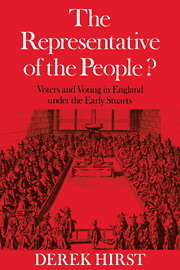Book contents
2 - The county electorate
Published online by Cambridge University Press: 15 December 2009
Summary
The forty-shilling freeholder
By far the largest numbers of voters were contained in the county constituencies. There should have been little problem in principle, if not in practice, about the identity of these people, for they were defined by statute in 1430 as the 40s. freeholders. Sir Edward Coke in his Institutes denied the existence of any difficulty: ‘Who shall be electors, and who shall be chosen … you may reade in the positive lawes of 7H.4 cap. 15. 11H.4 cap. 1 [etc. through to 8 and 23 H.VI]…and which need not here be particularly rehearsed’, and went on to complain that ‘much time is spent in Parliament concerning the right of elections, etc. which might more profitably be imployed pro bono publico’. After the outbreak of war, the apparently undisputed nature of the county franchise could be used by Sir John Spelman to make an effective polemic point against the claims of Parliament to represent the people of England. He pointed out that while ‘The Lords vote in respect of their Barronies derived from the Crowne, the Commons Vote in right of their electors whom they represent, at least nine parts of the Kingdome, neither doe nor may Vote in their election, the Clergie in respect of their spirituall livings, may not, nor the substantiall Coppy-holders, Farmours nor Lessees for years … and all that have not 40s. per annum free-hold Land, which I imagine, cannot be above a tenth part of the Kingdome’.
Powerful voices argued that the 40s. freeholder electorate was plain in its extent. Voices might also have argued that it was plain in its composition.
- Type
- Chapter
- Information
- The Representative of the People?Voters and Voting in England under the Early Stuarts, pp. 29 - 43Publisher: Cambridge University PressPrint publication year: 1975



